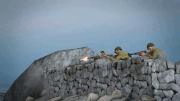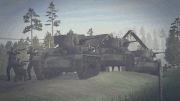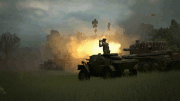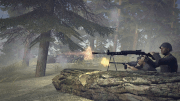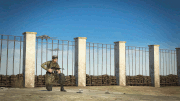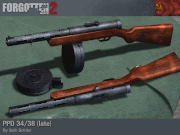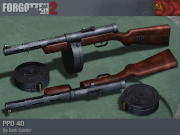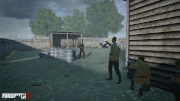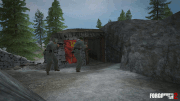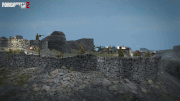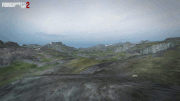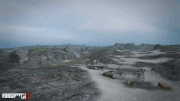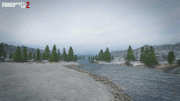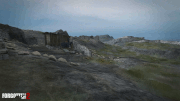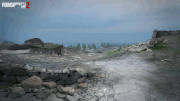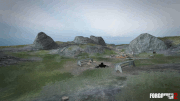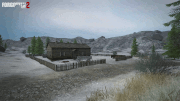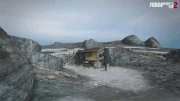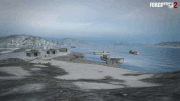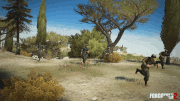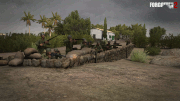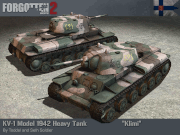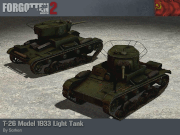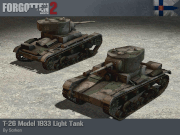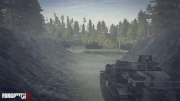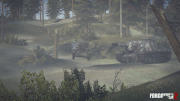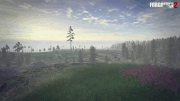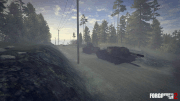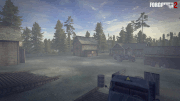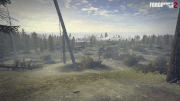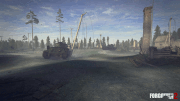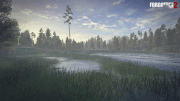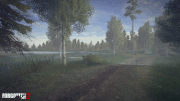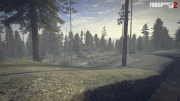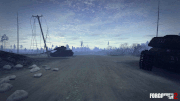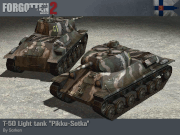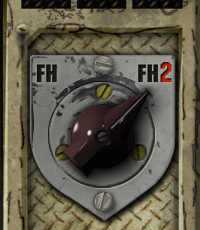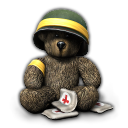 |
||
|
|
||
 |
||
|
ARCHIVES >>> 5/2020
The Road to Forgotten Hope 2.56 Part 6 by: Eat Uranium 15.05.2020 12:00 GMT
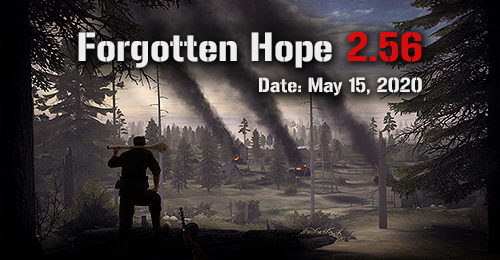
Hello and welcome back to another Forgotten Hope 2 update. We are pleased to announce that Forgotten Hope 2.56 is now live! You can download it by starting the Launcher. New and returning players can download the launcher from our downloads page. We hope to see you on the battlefield! For those of you who downloaded the pre-release files, the password is: 8d3v4AS1Ug That's all for today, but be sure to come back next time for another update. Until then, feel free to visit our Discord, our public forums, and/or our Twitter and Facebook pages to discuss this update and other news.
The Road to Forgotten Hope 2.56 Part 5 by: Eat Uranium 14.05.2020 18:00 GMT

Hello and welcome back to another Forgotten Hope 2 update. Today we have a few things to show off while you wait for tomorrow and the big update. To start with, we have a more complete changelog than the quick overview we gave yesterday, that you can read here. For those of you who missed it on our Discord, here is a large copy of our release image made by the talented FatJoe. Ts4EVER has continued his blog post where he explains a bit more about what to expect from the two new maps, and you can read that here. As some of you might know, both Ts4EVER and Slayer from our team regularly post gameplay videos of FH2, and they have both released this week compilations to say goodbye to 2.55 and welcome in 2.56. You can watch those here and here. Finally, while filming our trailer, Hawk also managed to take some amazing screenshots of our new content. Here are 8 of the best: That's all for today, but be sure to come back tomorrow for the release! Until then, feel free to visit our Discord, our public forums, and/or our Twitter and Facebook pages to discuss this update and other news.
The Road to Forgotten Hope 2.56 Part 4 by: Eat Uranium 13.05.2020 18:00 GMT

Hello and welcome back to another Forgotten Hope 2 update. Today we are showing off some final renders of weapons you will be able to use on Motovskiy Bay, and also covering some of the other changes that you will be able to find in 2.56. Firstly however, in acknowledgement of the large download size for 2.56, we have prepared a pre-release file that you can download now. We will release the password to this on Friday at the same time as the patch is released to the FH2 Launcher. In the late 1920's, fresh off his successful light machinegun design, Vasily Degtyaryov began to work on a submachinegun. Initially just a scaled down design of his earlier DP including the pan magazine, by 1931 it had be refined to a more conventional design with a 25 round box magazine chambered in the new Tokarev pistol cartridge. This design was finally adopted by the Army in 1935 as the PPD-34. Initial production was very slow, hundreds to a couple of thousand a year, and the Army was struggling to find a place for the new weapons. All in all, no more than about 5000 were made. In early 1939, an update to the design was introduced as the PPD-34/38, featuring a few minor changes to make the gun stronger and make magazines more interchangeable. However around the same time the Army withdrew all PPDs into storage in anticipation of the new SVT-38, and only a few NKVD border troops kept theirs. This would soon change again however, with the Winter War giving the Red Army a brutal lesson in just how effective submachineguns could be. In December of 1939, the weapons began to be re-issued to the Army, and by the middle of January these were supplemented by a drum magazine copied very closely from the Finnish Suomi KP/-31. These drums needed a feed tower to fit into the magazine well and were not considered reliable. About this time, the cooling holes on the barrel jacket were simplified to slots. No more than 15000 PPD-34/38s of all types were manufactured until March 1940. To simplify the design further and allow for a more reliable direct copy of the Suomi drum, the design was modified again. This new PPD-40 was visually distinct from its predecessors, with the two part stock to fit the new magazines. It also initially featured a fixed firing pin, but this change was problematic and was reverted within a month. About 80000 PPD-40s were produced during 1940 and into early 1941 before being replaced on the production lines by the cheaper and quicker to produce PPSh-41. Production of PPD-40s would continue inside the Siege of Leningrad using old tooling left behind by retreating factories, with nearly 45000 made to the start of 1943. Our PPDs have been made by Seth Soldier. 3 New playermodels: And last but not least, the final batch of screenshots showing off some new content: That's all for today, but be sure to come back tomorrow for another update. Until then, feel free to visit our Discord, our public forums, and/or our Twitter and Facebook pages to discuss this update and other news.
The Road to Forgotten Hope 2.56 Part 3 by: Eat Uranium 12.05.2020 18:00 GMT

Hello and welcome back to another Forgotten Hope 2 update. Today we have our other map in 2.56 to show off, but first we have a visual treat from Hawk in the form of a trailer: The arctic front was one of the most inhospitable theaters of the Second World War: a rugged moonscape of mountains, boulders and boggy lakes. Despite these obstacles and the freezing temperatures, the Soviet 12th Naval Infantry Brigade launched an amphibious assault across Motovskiy Bay with the aim of cutting off the retreat of the 6th Gebirgsjaeger Division. The Red Army was able to seize a bridgehead, but the German mountaineers launched a counter attack on the 4th of May 1942. The German commander issued orders to advance towards Hoehe 172.3, in the hopes of pushing the Russians back into the bay. Soon the German mountaineers and the Russian marines would be locked in deadly combat for the roof of the world. Motovskiy bay has been made by Ts4EVER. You can find the minimap and a preliminary vehicle listing here. Finally, just like yesterday we are going to end on a few more screenshots of some of the new things in 2.56: That's all for today, but be sure to come back tomorrow for another update. Until then, feel free to visit our Discord, our public forums, and/or our Twitter and Facebook pages to discuss this update and other news.
The Road to Forgotten Hope 2.56 Part 2 by: Eat Uranium 11.05.2020 18:00 GMT

Hello and welcome back to another Forgotten Hope 2 update. Today we are continuing where we left off yesterday by showing off two more vehicles that you will be able to find on the new map Tali. The Finnish Army first encountered the KV-1 in December of 1939, in a Soviet attack on the Mannerheim Line. This new design was essentially immune to their 37mm anti tank guns, and even the tracks were resistant against the most common anti tank mines. Still, they proved vulnerable to large satchel charges, and this might explain why only 2 of the type were captured and re-used. These two KVs were an up-armoured "1940" model and a "1942" model. The model 1942 KV-1 was captured on the River Syväri in the spring of 1942. In Finnish service the tank was found to be far from ideal. The crew were especially blind to the outside, and the shortage of spare parts and general unreliability of the vehicles meant they spent a lot of time in repair depots. Fuel consumption was noted to be more than twice that of the T-34. Both Finnish KV-1s would survive the war, being retired in 1955. Our model 1942 KV-1 was modified from Toddel's KV-1S by Seth Soldier. In 1930, the Soviet Union purchased 15 of the twin turreted 6-Ton Type A tanks from Vickers-Armstrong, along with the technical package to conduct their own further production. After a period of testing, the first T-26 design was accepted into service in 1931. This differed from the 6-Ton with slightly different turrets designed to take the DT instead of a Vickers, as well as a slightly modified engine that was only a near copy of the original. In 1933, the T-26 was updated with a new larger single cylindrical turret, mounting a 45mm antitank gun and a DT. This larger turret also allowed space for a radio to be fitted, though such tanks made up less than half the total. Radio equipped tanks are visually identifiable by a thick frame antennae around the top of the turret. The T-26 turret went through several changes, in 1935 it switched from riveting to welding, in 1936 a rear DT was added, and most significantly in 1938 the sides were sloped. In total, just over 10000 T-26 were manufactured between 1931 and 1941. They were present in large numbers during Operation Barbarossa, and consequently were lost in large numbers. While made quickly obsolete against advances in German armour, they would continue in service with the Red Army until 1945, particularly on the Finnish Front and in the Far East. The Finnish Army had similarly taken note of the Vickers 6-Ton, and had ordered 32 of them in 1936. A few of these tanks had served towards the end of the Winter War, and most were subsequently modified afterwards into T-26E using captured T-26 turrets. However, they were eclipsed in Finnish service by intact captured T-26s. All in all, 114 captured T-26 tanks served throughout the Continuation and Lapland wars. The majority of the Finnish T-26 were equipped with the 1933 pattern turret. A number of modifications were made to the tanks, and a few double turreted and flamethrower tanks were converted to the 1933 or 1938 patterns. Our T-26s were made by Sorken. Finally, we'd like to end today with a few screenshots showing off some of this new equipment. That's all for today, but be sure to come back tomorrow for another update. Until then, feel free to visit our Discord, our public forums, and/or our Twitter and Facebook pages to discuss this update and other news.
The Road to Forgotten Hope 2.56 Part 1 by: Eat Uranium 10.05.2020 18:00 GMT

Hello and welcome back to another Forgotten Hope 2 update. It has been a bit of wait since the previous release went live, and we have been busy working away on our next update. As usual we have some shiny new content to play with: new guns and tanks and maps. There have also been a lot of changes under the hood so to speak as well, and we think that version 2.56 will feel almost like a new game. Speaking of which, you are invited to join us on the servers when it goes live on: Friday 15th May 2020 As usual, we'd like to give a big thanks to our players for sticking with us and keeping the servers populated even after all this time. Additionally, we would like to thank our team of betatesters for their dedication to improving our work, as well as our developers for the time and effort they put in to make things happen. Last but not least, none of this would be possible without the web hosting generously provided by Fluestertuete. As always, what is an update without some new content, and today we are showing off one of the maps and one of the vehicles you will be able to find on this map: June 1944, Karelian Isthmus. The ill-prepared Viipuri-Kuparsaari-Taipale line faces a disaster as the Red Army captures the city of Viipuri on the 20th. Meanwhile the first skirmishes near the village of Tali had begun. On the foggy morning of the 25th, after a massive artillery barrage, the Red Army crushes the Finnish lines around lake Leitimo. The Soviet forces then target the crucial Portinhoikka crossroad, expecting to advance further to Juustila and Ihantala. In response, Major General Lagus sends his Armoured Division to face the Red Army onslaught, with German Luftwaffe detachment Kuhlmey arriving to assist the Finns just in time. The largest battle in the history of the Nordic countries is about to unfold ... Tali was made by the combined efforts of Flippy Warbear and hitmaker. You can find the minimap and a preliminary vehicle listing here. Design work on a new light tank was started in 1939, with the intention of producing a vehicle that would replace the T-26 in service. Despite some setbacks, by early 1941 the T-50 had reached readiness for production, but this was delayed by the need to retreat the factories in the face of the German invasion a few months later. In total, only 69 of this type were actually produced - they were as expensive to make as a T-34 and the engine was very unreliable. They were replaced in production by the T-60 and T-70. The Finns first encountered a T-50 in July of 1941, and managed to capture a single example later that year. This T-50 was later fitted with bolt on armour plates, and was used by the Finns as a command vehicle. It would ultimately suffer an unrepairable engine failure while preparing for the counterattack on Portinhoikka. This unique vehicle was nicknamed Niki by its crew, and the type as a whole gained the nickname Pikku-Sotka meaning "Small Pochard". Our T-50 was made by Sorken. That's all for today, but be sure to come back tomorrow for another update. Until then, feel free to visit our Discord, our public forums, and/or our Twitter and Facebook pages to discuss this update and other news.
|
|
||||||||||||||||||||||
 |
||||||||||||||||||||||||
























